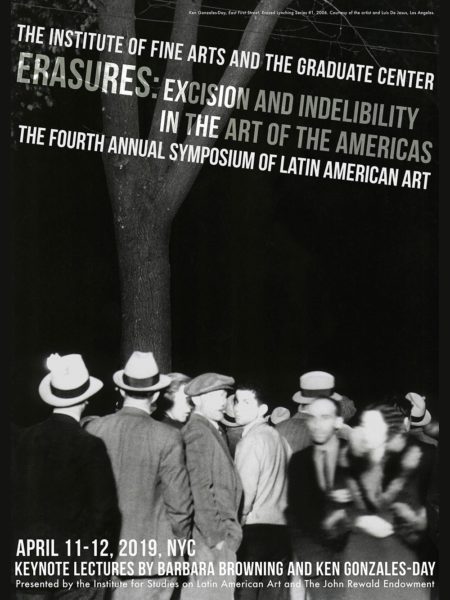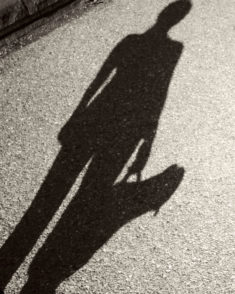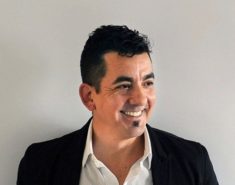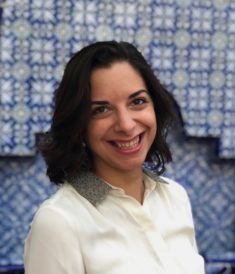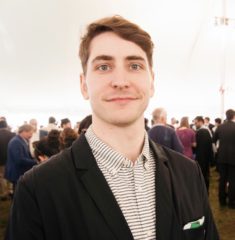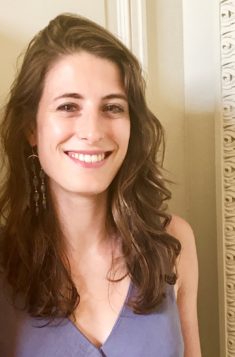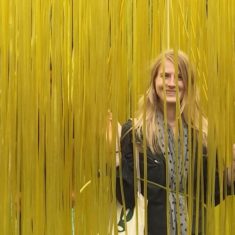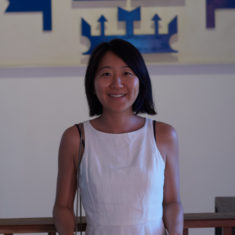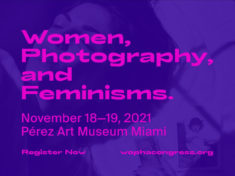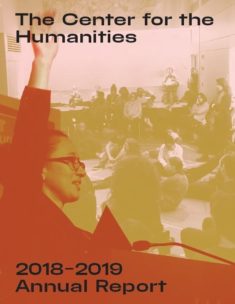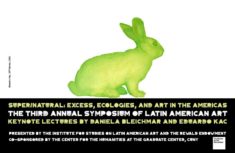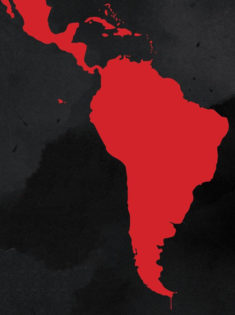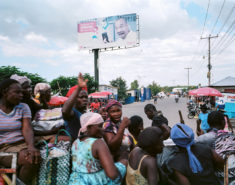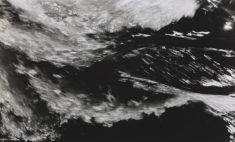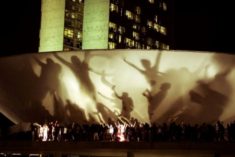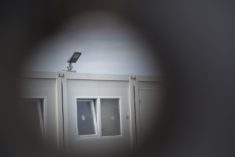About the Symposium of Latin American Art
Join us for "Erasures: Excision and Indelibility in the Art of the Americas," the Fourth Annual Symposium of Latin American Art, presented by the Institute for Studies on Latin American Art (ISLAA) and the John Rewald Endowment, and co-sponsored by the Center for the Humanities at The Graduate Center, CUNY, and the Doctoral Student Council at The Graduate Center, CUNY. The 2-day event will take place on Thursday, April 11th in the Skylight Room at the Graduate Center, CUNY from 9:30 am to 5:30 pm (reception immediately following at the James Gallery, 5:30–6:30 pm) and on Friday, April 12th at the Institute of Fine Arts, NYU from 9:30 am to 5:30 pm (reception immediately following, 5:30–6:30pm). The symposium will feature keynote lectures by Dr. Barbara Browning and Ken Gonzales-Day.
What can and cannot be erased? This question emerges when monuments are destroyed, cultural artifacts vanish, or the faces of the disappeared continue to interrogate government violence and corruption. Though the recent fire at the Museu Nacional in Rio de Janeiro resulted in the devastating loss of approximately twenty million objects, the impact goes beyond physical destruction. Marina Silva, Brazil’s former Minister of the Environment, went so far as to call the fire a “lobotomy of the Brazilian memory.” Alternatively, this past October Israeli artist Yael Bartana demonstrated the power of the void with her Monumento a la ausencia, in which footprints left in cement attest to lives erased and commemorate the fiftieth anniversary of the Tlatelolco Massacre in Mexico City. Observable in these examples as well as countless others, is that the excision—willful or unwitting—of objects and histories can be both destructive and productive, open and heal wounds, obfuscate and expose memory, and challenge and reinforce the permanence of indelibility.
Tragedies such as those noted above and subsequent actions to confront them shape this year’s symposium theme. Erasure is commonly understood as an obliteration of content or removal of all traces, often forcefully. And yet, as demonstrated by Horacio Zabala’s burned maps from the 1970s or Jacques Bedel’s erased Cordillera (1972), visual art maintains an uncanny ability to demonstrate resilience in the void of visible content. Erasure can manifest through strategies of elimination, cleansing, or effacement as aesthetic practice, or it might instead emerge in issues surrounding medium, as in the ephemerality of site-specific or performative work. It can likewise be invoked through cartographic, historiographic, or archival omissions, or as a result of natural and man-made disasters or iconoclasm. Yet it is imperative not to neglect erasure’s productive and emancipatory potentials. Through broad and interdisciplinary contributions from a diverse group of scholars, the symposium will promote conversations about the risks, rewards, and knowledge that arise when absence comes into contact with socio-political realities. Beyond physical and spatial considerations, we must also interrogate history and the void that is left by historical silence, highlighting the unsaid, the unspoken, and the invisible.
SCHEDULE:
Thursday, April 11th, 2019
The Skylight Room (Room 9100) The Graduate Center, CUNY,
365 Fifth Avenue
9:30 AM–5:30 PM (Reception to follow in the James Gallery)
Ana Cristina Perry, Ph.D. Candidate, The Graduate Center, CUNY
Katherine Manthorne, Professor of Modern Art of the Americas, The Graduate Center, CUNY
10:30 AM-12:30 PM Panel 1: EMBODYING THE VOID
Moderator: Tie Jojima, Ph.D. Student, The Graduate Center, CUNY
Discussant: Pedro Erber, Associate Professor of Luso-Brazilian Studies, Cornell University
“A Politics of the Archive: Rosângela Rennó’s Books and the Secret Files of the Dictatorship,” Marina Bedran, Ph.D. Candidate, Princeton University
“Regarding Permanence and Invisibility in the Work of Adriana Corral,” Emily Butts, M.A. Student, University of Texas, Austin
“Não ouço, não vejo, não falo”: Estratégias e políticas do desaparecimento nas narrativas soropositivas de Leonilson,” Yuji Kawasima, Honorary Research Fellow, Universidad Complutense Madrid
12:30-1:30 PM Lunch
1:30-3:30 PM Panel 2: DESTRUCTION AND DISAPPEARANCE
Moderator: Sonja Gandert, Ph.D. Student, The Graduate Center, CUNY
Discussant: Carla Macchiavello, Assistant Professor in Art History, Borough of Manhattan Community College, CUNY
“Llevando “La Calle” al cubo blanco: la destrucción como liberación en la instalación del Grupo SUMA durante la Sección Anual de Experimentación del Salón Nacional de Artes Plásticas (1979)” Marcela Torres Martínez, M.A. Student, Universidad Iberoamericana
“El Enigma del Huevo,” Elise Chagas, Ph.D. Student, Princeton University
“Traces in the Absence: Carlos Cruz-Diez’s Kinetic Art in the Time of Venezuelan Migration,” Natalia Sassu Suarez Ferri, Associate Lecturer, University of St Andrews
3:30-4:00 PM Coffee/Tea Break
4:00-5:30 PM KEYNOTE LECTURE
Introduction: Anna Indych-López, 2018–2019 Stuart Z. Katz Professor in the Humanities & the Arts, City College of New York, CUNY; Professor of Latin American and Latinx Art, The Graduate Center, CUNY
O Brasil sob rasura: Effacement and the Trace of Violence, Barbara Browning, Professor in the Department of Performance Studies, Tisch School of the Arts, NYU
5:30-6:30 PM Reception in the James Gallery
Friday, April 12, 2019
The Institute of Fine Arts, NYU, 1 East 78th Street, Lecture Hall
9:30 AM - 6:30 PM
9:30 AM Coffee
10:00 AM Welcome and introductory remarks
Madeline Murphy Turner, Ph.D. Candidate, The Institute of Fine Arts, NYU
Edward J. Sullivan, Deputy Director; Helen Gould Sheppard Professor in the History of Art; The Institute of Fine Arts and College of Arts and Sciences, NYU
10:30 AM-12:30 PM Panel 3: NARRATIVE DISPLACEMENTS
Moderator: Brian Bentley, Ph.D. Candidate, The Institute of Fine Arts, NYU
Discussant: Yasmin Ramírez, Ph.D., Independent Curator
“Latent Traces: Archival Vulnerability and Embodied Memory in Nicolás Guillén Landrián’s documentary Desde La Habana ¡1969! Recordar,” Patricia Ortega-Miranda, Ph.D. Student, University of Maryland, College Park
“Si no pudiera hacer arte, me iba: Aesthetics of Disaster as Catharsis in Puerto Rican Contemporary Art,” Carlos Rivera Santana, Research Associate, Centro de Estudios Puertorriqueños, Hunter College, CUNY
“Performando Ficciones: Recreaciones de la Memoria Migrante,” Ana María Garzón, Curator and
Research Professor, Universidad San Francisco de Quito
12:30-1:30 PM Lunch
1:30-3:30 PM Panel 4: ERASURE AND POWER
Moderator: Francesca Ferrari, Ph.D. Student, The Institute of Fine Arts, NYU
Discussant: Marisa Lerer, Assistant Professor of Art History, Manhattan College
“Deliberate Confusion: Abstraction as Iconoclasm,” Katie Ligmond, Ph.D. Student, University of California, Santa Cruz
“Saving Face, Saving Place: Visual Occupation of the Zocalo in the Aftermath of the U.S.-Mexican War,” Erika Nelson Pazian, Ph.D. Candidate, The Graduate Center, CUNY
“From Colonial Celebration to Contemporary Critique: Barcelona’s Columbus Monument and Daniela Ortiz’s Ofrenda,” Ivana Dizdar, M.A. Student, Columbia University
3:30-4:00 PM Coffee/Tea Break
4:00-5:30 PM KEYNOTE LECTURE
Introduction: Christine Poggi, Judy and Michael Steinhardt Director; Professor of Fine Arts, The Institute of Fine Arts, NYU
The Erased Lynching Series: Art at the end of absence, Ken Gonzales-Day, Professor of Art, Scripps College
5:30-6:30 PM Reception
The symposium is organized by current PhD candidates Brian Bentley, Madeline Murphy Turner, and Ana Cristina Perry, and PhD students Francesca Ferrari, Sonja Gandert, and Tie Jojima; in consultation with Professors Anna Indych-López, Katherine Manthorne, and Edward J. Sullivan.
Presented by the Institute for Studies on Latin American Art (ISLAA) and the John Rewald Endowment, and co-sponsored by the Center for the Humanities at the Graduate Center, CUNY, and the Doctoral Student Council at the Graduate Center, CUNY,and the James Gallery.
